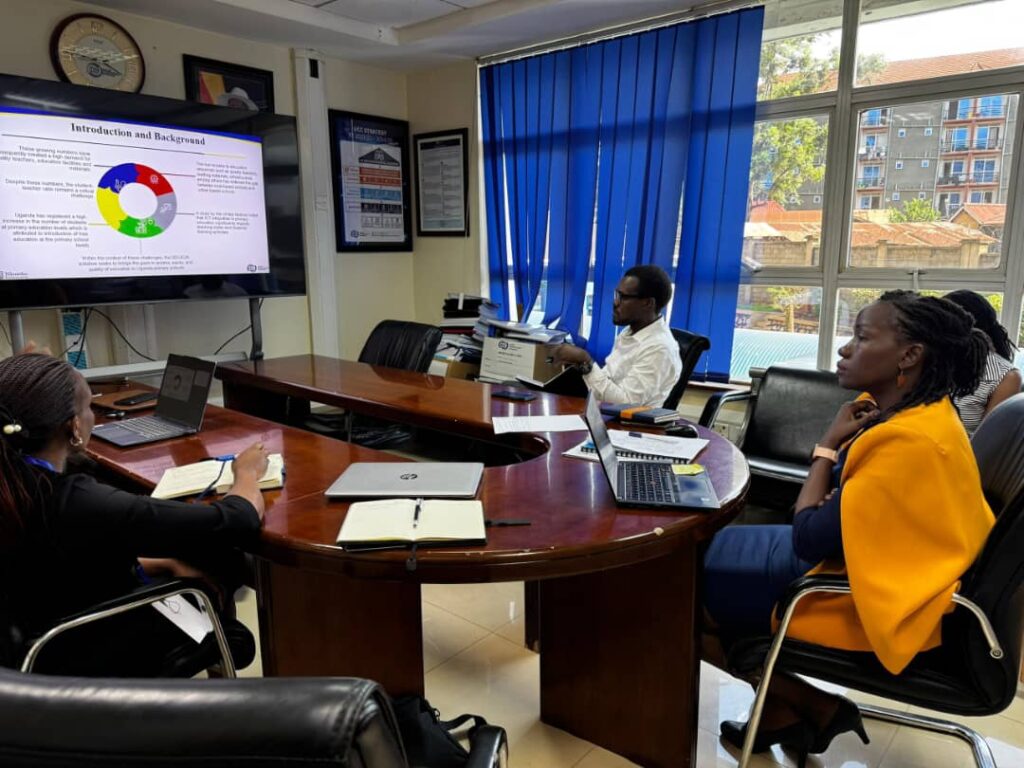On Monday, 12th May 2025, the Uganda Communications Commission (UCC) officially launched the Advancing Digital Learning for Primary Schools in Uganda: A Digitally Enabled Community-Centered Early Childhood Development Approach (DECEDA) project during an inception meeting held at the UCC offices in Kampala.
This initiative comes at a critical time when Uganda faces persistent challenges in improving learning outcomes, especially in the upper primary levels (P6–P7), where national assessment results have highlighted performance gaps in literacy, numeracy, and science. According to the National Assessment of Progress in Education (NAPE), less than 40% of Primary 6 learners demonstrate proficiency in literacy and numeracy, with rural schools performing significantly below national averages. Many of these schools operate with limited teaching resources, overburdened teachers, and minimal exposure to ICT-enabled learning tools. The DECEDA project seeks to address these inequalities by leveraging technology, training, and regional school networks to transform learning experiences for P6 and P7 learners.
This initiative, implemented by Nkumba University and its partners with support from Uganda Communications Commission under the UCUSAF grant for Promotion Of Universal Access And Usage Of Digital Technologies For Social Economic Development In Uganda, aims to revolutionize learning outcomes in underserved rural primary schools by leveraging digital tools, community-based structures, and well-resourced schools as learning hubs.
About the Project
The DECEDA Project is designed to establish a digitally enabled, community-centered early childhood development model. Through this, the project will connect 30 primary schools across Uganda’s five regions using technology to bridge resource gaps and expand access to quality learning.
Each region will have an anchor school equipped with ICT infrastructure that will serve as the central hub for teacher support, digital content creation, and remote class delivery to 4 nearby beneficiary schools.
Key components of the project include:
- Online and offline learning platforms including live streaming, recorded sessions, and a mobile application with offline access.
- Curriculum development and teacher training focused on digital pedagogy and ICT integration.
- Capacity building for subject teachers based on ICT assessments and learner performance.
- Public awareness and engagement via a dedicated website, YouTube channel, social media, and mainstream media.
- Infrastructure setup ensuring access to power, internet, and secure storage at schools.
Implementation Phases
The project will be implemented in three phases over several months, guided by 10 core work packages covering research, system development, training, monitoring, and dissemination. To ensure lasting impact, the project will be:
- Inclusive: Beneficiary schools will include mixed, single-sex, and special needs institutions.
- Sustainable: A long-term internet and infrastructure maintenance plan is being developed.
- Collaborative: Monthly physical meetings and bi-weekly reports will ensure accountability and coordination.
As Uganda continues to push its digital transformation agenda, the DECEDA Project stands as a strategic intervention to improve education equity and learning outcomes for all children, especially those in rural communities.
Watch this space for more updates on our website www.deceda.org and our social media platforms as we advance digital learning, one school at a time.

DECEDA Lead Team During an Inception Meeting at UCC


















Discussion about this post